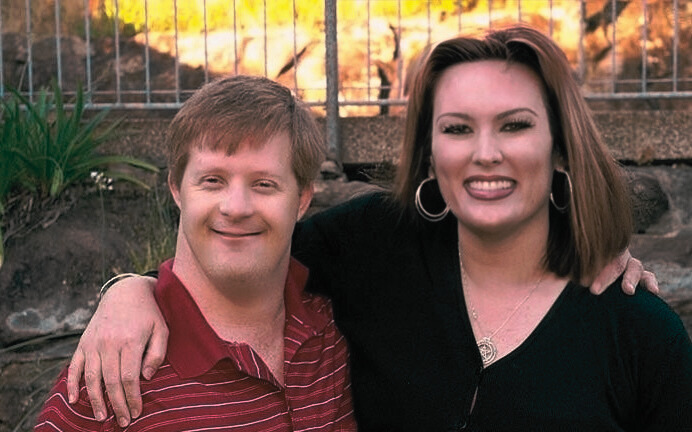Michael had Down syndrome, but I never saw him as "disabled", or less able than anyone else; he was always just my brother. One of the founding principles of the NDIS is that people with disability are assisted to live "an ordinary life". By that they mean that everyone, including people like Michael, gets the same opportunities to live a life that anyone else would, if they didn't have a disability. I don't think that ever would have been enough for him though, because in his eyes, he lived an extraordinary life. He was a social creature; one of our nicknames for him was "Casanova", because wherever he went, he'd put the charm on for the ladies. Everyone loved him. He made friends everywhere he went, remembered everyone's birthday, and had this incredible ability to see the good in every person he met.
While the world saw someone with an intellectual disability, I saw someone who was quick witted, funny, loving, accepting and most of all, he was happy. When I think of him now it's always with his big, beautiful smile that could light up a room.
Michael's Lessons
Love your family and friends, and tell them often.
Never go to bed angry.
Music and dancing should be mandatory.
Accept people exactly as they are.
When the footy is on, nothing else exists.
Cold dinner is not good dinner.
These weren't just things Michael said, they were how he lived every single day.
I spent time working with traditional disability services before starting Central Coast Care, and I kept seeing approaches that would have made Michael smaller, not bigger. Services that focused on deficits instead of strengths, that tried to make people fit into existing programs rather than building supports around who they actually were. An often used phrase is that someone 'doesn't have capacity' to make decisions around what their life looms like; I see that as a problem with the service, not the person, because everyone communicates what they need, we just need to be better listeners.
Michael's life showed me that the question isn't "What's wrong with this person that we need to fix?" but rather "What does this person need to live their best possible life?" The difference between those two approaches changes everything about how support is delivered.
When I lost Michael in 2014, I was living 6 hours away, and I spent a long time regretting the time I'd missed with him. But in my grief, I also realised that some of his most important lessons had taken me years to fully understand, and he was still with me. His openness and genuine nature wasn't naivety, it was wisdom. His acceptance of life wasn't passive, it was a choice to see what he had, not what other people may have thought he lacked.

Julie with her brother Michael, whose life guides Central Coast Care's approach.
How Michael Influences Our Work
- We see the person first, not the disability
- Everyone has a voice, even if it's quiet
- Every single person has something valuable to contribute
- Always focus on what's possible, not what's wrong
- Creating genuine community connections is key
- Approach challenges with curiosity, not judgement
- Never give up on anyone
This company exists because I couldn't bear the thought of other families experiencing the gaps and failures I'd seen in the disability sector. Every person we support deserves what Michael had - genuine relationships, respect for who they are, and support that helps them be more themselves, not less.
Our neurodivergent-led approach comes from understanding that lived experience matters. Our focus on complex care comes from knowing that the people others call "too difficult" often just need someone who sees their potential instead of their problems.
Michael is with me every day now. When we're supporting someone others have given up on, when we're fighting for proper funding, when we're celebrating someone's achievements that others said weren't possible, he's right there with me.
People sometimes ask if this work is emotionally difficult, given my personal connection to disability. The truth is, it's the most meaningful thing I could possibly do. Every time we help someone achieve something others said was impossible, every time we create genuine inclusion, every time we see someone's face light up because they feel truly understood, for me, that's Michael's legacy.
This is why we'll never be a typical disability service. We're not interested in managing people or maintaining the status quo. We're here to help people live their most authentic, connected, 'extraordinary' lives, because everyone deserves what Michael showed me was possible.
When you work with us, you're not just getting a service; we work hard for real inclusion. You're becoming part of a community that believes in the infinite potential of every person, no matter how the world might try to label or limit them. That's Michael's gift to everyone we support.
